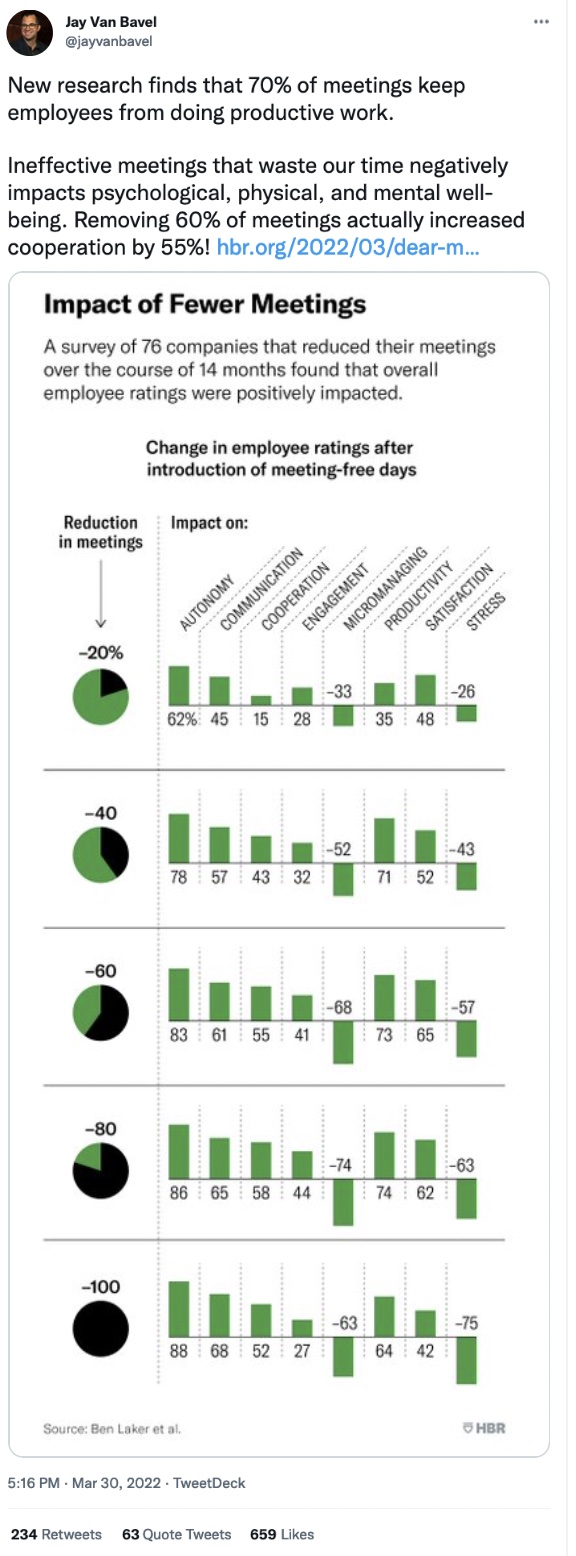How can we measure whether a meeting is productive or not? And if we can, what is the percentage of meetings that keep employees from doing productive work? 10%? 15%? 80%?
Did you know that 70% of meetings keep employees from doing productive work? Boro baba. In this post I will show that there is no reason for you to take such a statistic seriously. Specifically, let me take you on a journey where I will show how people can promote ‘new research’ that turns out to be neither ‘new’ or ‘research’.
The other day I saw a tweet saying that new research “finds that 70% of meetings keep employees from doing productive work.” Here is the tweet:

I decided to go to the source of the tweet, an article at Harvard Business Review from March 9, 2022. In this article we actually see the reported statistic:
Meetings serve different purposes, ranging from informal social gatherings to formal brainstorming sessions. They often show up on our calendars as recurring events (with no end date in sight!). New research shows that about 70% of all meetings keep employees from working and completing all their tasks.
I did not necessarily expect a long description of the methodology or data used to make such a statement. But I was hoping for a URL to a peer-reviewed study. However, there is no actual research in the article, or a link to a study, only a link to a blog post at a company blog (for a company trying to make meetings better with automatic notes) saying that 70% of all meetings keep employees from working and completing all their tasks. I decided to read the blog post. Here we find the following paragraph:
In fact, 70% of all meetings keep employees from working and completing their tasks.
You gotta be kidding me. Again, no research. Just the ‘fact’ that 70% of all meetings keep employees from working and completing their tasks. Again, I decided to visit the link hoping that this time would bring me straight to the source. Not a source, but the source. The URL brings me to an article at Forbes. Here is what it says about 70%:
70% of all meetings are a waste of time, 70%! That is a lot of unproductive time that could have been better spent doing the actual work.
70% of all meetings are a waste of time. Interesting! But wait, no hyperlink? Luckily, there is some follow-up text that might be the actual source:
The University of North Carolina surveyed 182 senior managers in various industries: 65% said meetings keep them from completing their work. 71% said meetings are unproductive and inefficient. 64% said meetings come at the expense of deep thinking.
We are getting closer. However, none of these numbers say 70%! Where did the 70% go? I guess it is easier to say 70% than 71%, but why? And the University of North Carolina did not survey people. Some researchers at University of North Carolina surveyed people, I hope. There is only one way to find out. Let us visit the hyperlink.
This brings us to an article at … Harvard Business Review. Full circle. To make matters worse, this article is from 2017. In the grand scheme of things, I guess 2017 is new’ish, but it is not new research. This is not how it should work.
Let us take a look at the article. Here is what the actual researchers say they did:
In a recent survey we conducted with nearly 200 senior executives from diverse industries, only 17% reported that their meetings are generally productive uses of group and individual time.
So this is the research we now use to state the fact that ‘70% of meetings keep employees from doing productive work’? Without further information, I will not call this serious research. How did you sample the nearly 200 senior executives? Are they representative for senior representatives in the United States? Outside the United States? What exact questions did you ask? Should we expect certain response biases? When exactly was the data collected? Too many questions and no answers.
Here is some relevant info from the article:
We surveyed 182 senior managers in a range of industries: 65% said meetings keep them from completing their own work. 71% said meetings are unproductive and inefficient. 64% said meetings come at the expense of deep thinking. 62% said meetings miss opportunities to bring the team closer together.
71% said meetings are unproductive and inefficient. However, you cannot conclude that 70% of meetings are unproductive because ~129 senior managers (71% of 182) say meetings are unproductive and efficient. Maybe the 71% of senior managers should be better at managing meetings?
The ‘70% of meetings keep employees from doing productive work’ fact is a meaningless statistic. Accordingly, people should not – uncritically – share such numbers.